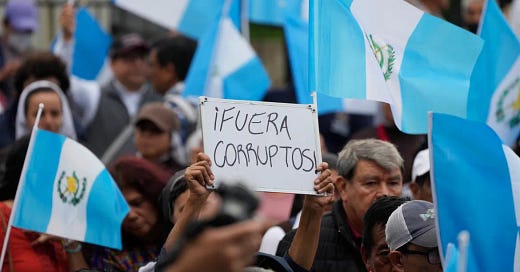Guatemalan president-elect Bernardo Arévalo personally presented a request for judicial protection to the country’s Supreme Court, an effort to stop prosecutors and judges who have sought to overturn his election victory. Arévalo asked the court to invalidate legal actions regarding the general election carried out by attorney general Consuela Porras, Judge Fredy Orellana and prosecutor Rafael Curruchiche. (Soy 502).
The request is “backed by the strength and enthusiasm of the Guatemalan population. A population tired of the tricks of the corrupt and longing for a better future,” Arévalo wrote on social media. Thousands of citizens protested in Guatemala City yesterday, supporting Arévalo’s victory and calling for the resignation of judicial actors who have persecuted him. (Associated Press, Al Jazeera)
Arévalo won the Aug. 20 presidential runoff in a landslide, but prosecutors have continued pursuing multiple investigations related to the registration of Arévalo’s Semilla party, and alleged fraud in the election. Last week agents from the Attorney General’s Office opened boxes of votes and photographed their contents in an unprecedented violation of Guatemala’s electoral law. (See last Thursday’s post.)
The United States called on Guatemalan authorities to end their "intimidation efforts" against election officials and members of Arévalo’s Semilla party, said the U.S. Ambassador to the Organization of American States, yesterday. (Reuters)
“We all saw the images of the recent raids on electoral storage facilities, in which sealed ballots were opened, and ballots taken out and manipulated,” said Ambassador Francisco O. Mora. “In a healthy democracy, institutions don’t tamper with ballot boxes after election results have been officially certified by the appropriate authority.”
Mexico
Former Mexican Foreign Minister Marcelo Ebrard announced a new civil society group, El Camino, aimed sustaining his bid for the presidency, after he lost the competition for the ruling Morena party’s nomination. The deadline has passed for independent candidates to register, and for forming a new party, but he is in negotiations with Movimiento Ciudadano, reports El País.
Regional Relations
The U.N. General Assembly annual opening starts today. “The gap between the demand for international cooperation and its supply is widening,” according to the Carnegie Endowment for International Peace. “Complicating matters, today’s diplomatic fault lines run not just East-West—pitting China and Russia against the community of advanced market democracies—but also North-South, setting richer nations against lower- and middle- income countries.”
Brazilian President Luiz Inácio Lula da Silva will speak today, a return to the rostrum he last occupied in 2009, the last year of his previous presidency’s second term. He is expected build on his foreign policy themes: pushing for global governance that strengthens the Global South and advocating diminishing the dollar’s dominance in trade. He has sought a middle ground between China and the United States, reports the Associated Press.
“The question of how Brazil should approach leadership of the G-20 brings to mind the challenge it faces in navigating the debate over BRICS expansion. But Brazil’s interests are quite different in the two groups,” writes James Bosworth in World Politics Review. In the G-20, Lula' should “play a middle-power role in reshaping the connections between the old power centers of the G-7 and the rising emerging markets of Asia, Africa and Latin America. That’s a role Lula has played quite well in the past, as well as more recently, during last month’s conference on the Amazon and deforestation.”
Dominican Republic President Luis Abinader said he would meet United Nations chief António Guterres tomorrow to discuss allowing humanitarian supplies to pass through his country's shuttered border with Haiti, reports Reuters. (See yesterday’s post.)
A Russian contingent of soldiers in a Mexican military parade this weekend has drawn criticism in relation to Russia’s invasion of Ukraine. Mexican President Andrés Manuel López Obrador defended the decision, saying all the countries Mexico has diplomatic relations with were invited, reports the Associated Press.
El Salvador
The a critical factor in Nayib Bukele’s successful crackdown on gangs in El Salvador is his dismantling of democratic institutions, reports the Washington Post.
Ecuador
A professionally produced music video featuring one of Ecuador’s most feared drug lords, filmed within the country’s most notorious penitentiary, “taunts a government that has proved incapable of seizing control of its prisons back from the increasingly powerful gangs,” reports the Washington Post.
Migration
Jamaica’s swift deportation of Haitian migrants that arrived to the country by boat this month has caused sharp criticisms, with some asserting that the move breaks with “the country’s treaty obligations of the 1967 UN Refugees convention,” reports the Americas Migration Brief.
Emma Lewis contrasts the rapid deportation to the asylum process granted to another group that arrived in July. “The social media response from Jamaicans to the Haitians’ arrival was very mixed,” she writes in Global Voices.
Colombia
Colombia’s Special Jurisdiction for Peace (JEP) is holding a hearing for former members of the army who will admit their participation in 296 cases of murders of civilians ("false positives") that occurred between 2005 and 2008 in the department of Casanare. (Telesur)





